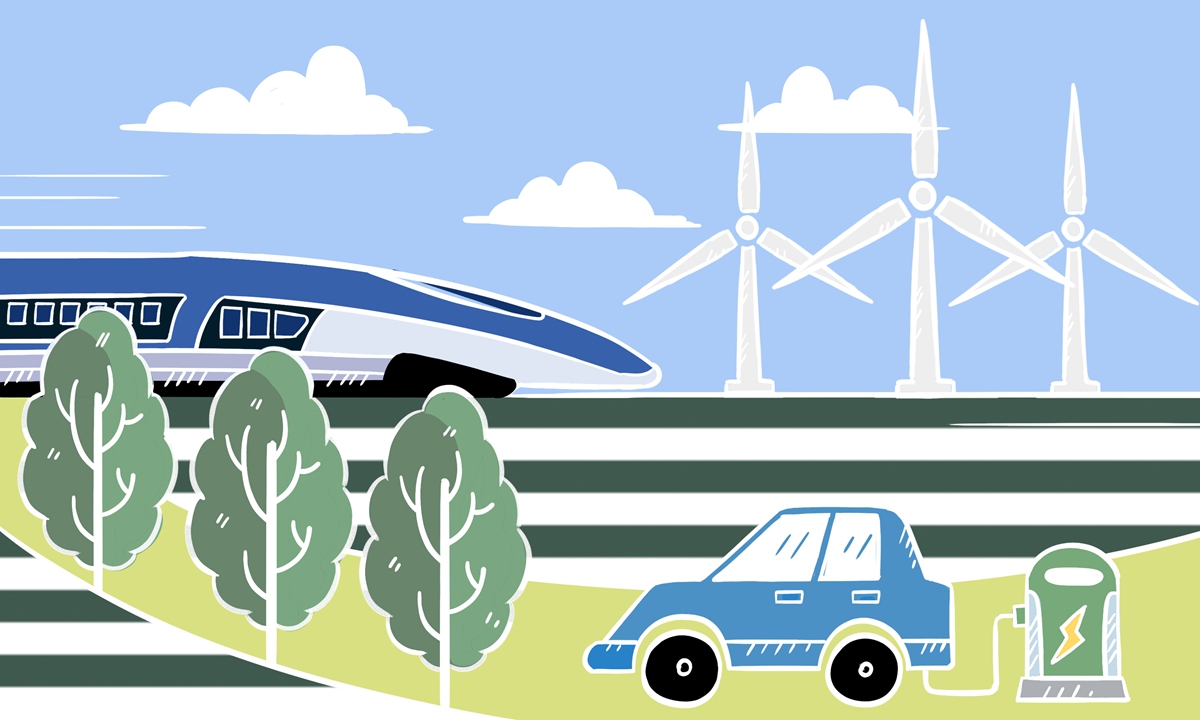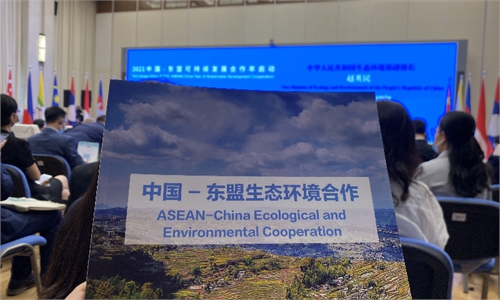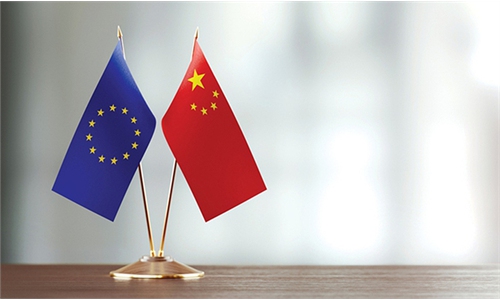COMMENTS / COLUMNISTS
China becomes a leader in global war against climate change

Illustration: Chen Xia/GT
The system belongs to a great technology and engineering breakthrough which, together with China's 40,000-kilometer-long high-speed railways crisscrossing the country, will significantly reduce air flights and long-distance auto driving - drastically cutting fossil fuel use and carbon dioxide emissions, key targets in the battle against climate change.
Global climate change is now wreaking havoc on our living planet. From June 1 this year, the world has witnessed with alarm the devastating horror rains and their destructions in Germany, Belgium and central China's Henan Province. In Germany alone, more than 160 people were killed by the deluge.
For many Americans and Canadians, climate change used to be a distant concern, but the crisis has now arrived on their doorstep. Hundreds died in unprecedented triple-digit heat in British Columbia, Oregon, Washington and other western US states in late June when a so-called "heat dome" of enormous proportions struck the region and lingered there for days. Television footage showed people collapsed trying to make their way to cooling shelters.
Scientists have garnered sufficient proof that global warming is triggered by a combination of warming Arctic temperatures and an increasing accumulation of heart-trapping greenhouse gas emissions, which have been caused by the burning of fossil fuels like coal, gas and oil.
It's time for all nations on this globe to get serious in mounting collective efforts to fight worsening climate catastrophe. The world did little during the past four years of former US president Donald Trump, whose administration refutes Earth's atmospheric change calling it a conspiracy, although severe weather is causing an estimated $100 billion in economic damage to the US every year. Trump was more interested in fighting trade and technology wars than fighting a war to alleviate the world's climate crisis.
The current Biden administration has vowed to do more than Trump, but his climate agenda and spending agenda is being obstructed at US Congress by the Republicans. Whether his much heralded $1.2 trillion infrastructure and climate bill could win the support of the legislators, remains uncertain after two months of debating and filibustering.
China, relying on its growing economic and technological strength, has become a leading global force in combating climate change. Low emission high-speed railway network and the superfast electro-magnetic maglev train system are evidence of the effort.
China's central government has made two signature commitments on climate, pledging that the country's emission of carbon dioxide will peak before 2030, and the country will achieve carbon neutrality before 2060, when the amount of carbon emissions into the atmosphere will be offset by the forests and other high-tech methods.
Now, China leads the world in the number of nuclear power stations and hydropower generators being constructed. The country's industrial manufacturing capability sets the foundation for it to undergo a major energy structure reform, trending to cleaner and recyclable energy variants.
And, the government has been particularly keen in advancing new-energy vehicles. A number of Chinese automakers have begun to send internal combustion engines to the scrap heap and are pouring billions of yuan to electric motors and batteries. Driven by favorable taxation and fees from the government, droves of Chinese urbanities are persuaded to switch to electric car in the country's megacities such as Beijing, Shenzhen and Shanghai.
For example, in Shanghai electric cars can get free license plate while fossil fuel car buyers have to go through an auction procedure to get a plate that is lengthy and pricey. Also, the eastern Anhui Province is dictating all government departments and state-owned enterprises there to change at least 30 percent of their vehicle fleet to electric cars by 2025. In Shenzhen, all taxi cabs and public buses are now electricity-driven.
Thanks to the government's preferential policies, China's new-energy vehicle sale is expected to exceed 2.2 million in 2021, accounting for more than 10 percent of all vehicle sales.
In another push to restrict carbon dioxide emissions, China launched a landmark emissions trading market in July, which will prove to be a powerful tool in its efforts to drive down climate change-causing greenhouse gases and be carbon neutral by 2060. Considering the transaction volume, the market is now the world's largest carbon trading market.
China announced a plan to establish a national carbon market in 2012. The plan called for setting emission caps for major electricity companies, allowing these firms to buy the right for emissions from others with a lower carbon footprint.
As many as 2,225 Chinese power producers have joined the trading system. More steel, cement and other types of firms will join over time. The market will inspire tens of thousands of Chinese companies to cut their emissions or face deep economic hits.
In summary, China has been a global leader in fighting global climate crisis, which is posing increasing and imminent danger to Earth's atmospheric security, biodiversity, and the very survival of our humankind. The world ought to take even bolder moves to arrest a continuous deterioration of climate change, while dragging feet will only cause more atmospheric ruins and human deaths.
The author is an editor with the Global Times. bizopinion@globaltimes.com.cn



